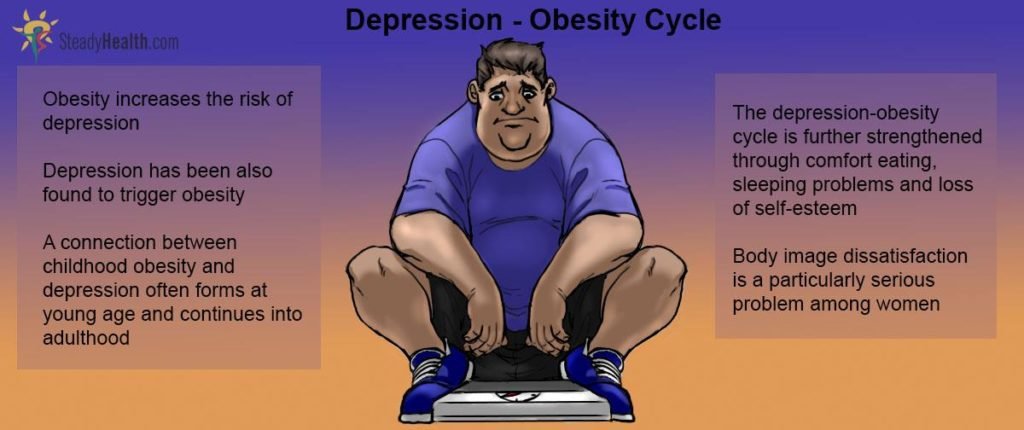What is the Role of Obesity in Mental Health?

There is a major role of obesity in mental health as well as physical health. Being overweight does not only affect your physical appearance but is also risky for your health, both mental and physical health. Studies have shown that globally the number of obese people has increased three times from 1975 to 2016.
There has been an increase in the number of deaths due to obesity. In 2019, it was known that almost 38 million children under the age of 5 were overweight.
But what exactly is obesity and when is one considered obese. Let’s first talk about the term Obesity.
What is Obesity?
Obesity is a long-term disease that involves the excessive build-up of body weight. In general, it is a weight that is more than a healthy weight. It is known as having a BMI (Body Mass Index) of 30 or more, in an adult.
You can calculate your BMI by measuring your height (m) and weight (kg) to know your body size. It mostly happens because of consuming more calories than burning by physical activities. Obesity is a medical issue that increases the risk of health issues or diseases.
Childhood Obesity is also a serious medical issue that will affect both a child and an adolescent. Age needs to be known when defining obesity in children. Children who are obese in their childhood grow up to be obese in their adulthood as well. Obesity is a common disease and childhood obesity is one of the greatest dangers of our future generation. Obesity is now one of the most common causes of death globally.

Symptoms of Obesity
The most prominent symptom of obesity is more than average body weight.
Some other symptoms can include:
IN ADULTS
- Difficulty in breathing
- Excessive fat consumption around the waist
- Impact Psychologically ( low confidence and self-esteem, depression, social isolation, guilt)
- Sleep issues
- Liver problems
- Gallstones
- More Sweating
- Feeling more tired throughout the day
- Unable to do easy physical tasks
- Back pain
- Joint pain
IN CHILDREN
- More fatty tissues around breast area
- Feeling asthmatic during physical tasks
- Constipation
- Early Puberty in Girls
- Delayed Puberty in Boys
- Eating Disorder
- Lack of energy for simple tasks
- Larger body frame than an average body
- Stress Eating
- Sleep Apnea
If you notice any symptom of obesity in any child or adult, deal with it as soon as possible by visiting a doctor. There are other ways in which you can deal with an obese person. Obesity can sometimes be a consequence of biological, psychological, or any social factor. So let’s look at the risks that can lead to obesity.
You can use this weight loss supplement which help you reduce stress.
Risk Factors of Obesity
There can be a lot of factors that can lead to the risk of developing obesity:
- Inherited by family
- Hormonal impact
- Genetic weakness
- Poor Sleeping schedule
- Slower metabolism rate as you grow older
- Physiological aspect
- Lack of Physical movement
- Overeating
- Health related issues
- Birth control pills or steroids
- Poor Diet
- Economic aspects
Some more known factors that lead to obesity include; Lack of sleep, pregnancy after the ’40s, quitting smoking (one who quits smoking eats more than usual to avoid smoking which leads to weight gain), stress, attempts to lose weight in the past which caused fast weight gain. But, these risks of obesity can be altered and you can do it by improving your lifestyle, diet and making changes in your overall behavior to maintain your physical health.
There are times when you do not realize or know the path you are following will lead to being obese and you just keep eating whatever you love and end up binge eating because of multiple reasons. These people realize the harm they have caused to their bodies too late or some don’t even accept it ever. No matter what the situation may be, it is always better to know about the good and bad influences of things on you.
Read: Revitaa Pro Review – Does it Work & Should You Buy it?
Complications of obesity

After talking about the symptoms and the risk facts of obesity, you must have clearly known and understood that being overweight or obese can cause a lot of complications in your health. Here is a list of complications involved in Obesity.
- Vascular Cardiac diseases such as Heart stroke or attack.
- Type 2 Diabetes
- High blood pressure
- Fat liver
- Some kinds of cancers which include breast cancer, colon cancer, ovarian cancer or endometrial cancer
- Kidney issues
- Issues in Gallbladder which includes Gallstones
- Sleep Apnea
- Digestion Issues
- High Cholesterol level
- Gynaecological problems such as Infertility
- Sexual issues
- Osteoarthritis
In most situations, the complications of being obese are mostly the same for adults and for children as well. But, Childhood obesity can lead to more issues when you become an adult. It is linked with more chances of premature death as well. Obese kids also go through the loss of breath, hypertension, and more risk of insulin resistance, fractures, early heart diseases, and various other mental health issues. Overall obesity has been found to lessen the lifespan of a person.
The Role of Obesity in Mental Health

It must have become really clear to you that obesity in mental health is caused by the medications. Increased food intake or more laziness can both lead to excessive weight gain with long-term consequences.
Furthermore, the development of conditions like joint pain or diabetes can make life harder for you. As medication is the basic element of its treatment, changing your diet and your lifestyle should be the main priority to lose weight.
General guidelines of healthy eating may not be effective alone in bringing about some change in this group of illnesses. Extra knowledge and help are most probably needed, to let the patients develop a better understanding of the link between mood and food, in order to make some meaningful changes in your diet.
For instance, serotonin is made up of amino acid tryptophan, which is mostly absorbed with foods that have more amount of carbohydrates, which explains why you get “carbohydrate cravings” and the extra consumption of comforting and sweet food from the carbohydrates group, to uplift your mood.
Read more on how to reduce mental stress to help you with weight loss: Revitaa Pro Review – Does it Work & Should You Buy it?
However, it has been known that the extra consumption of carbohydrates to improve your mood for the long-term, is lacking currently. The short-term reward caused by these foods can lead to excessive weight gain, and consolidate this behavior as a habit which may cause the patients to struggle if no help is offered.
Improvements in your food intake and your relationship with food will most likely result in less weight gain and better mental health, which can lead to you not taking any medication as well.

Does being obese or overweight affect your mental health?
Yes, it has been known that being obese leads to a negative effect on one’s mental health.
The most generally known psychological issues in obese people are low self-esteem and depression, even if there is no previous evidence of the history of mental illness.
The gender and the age of a person also play a huge role in the relationship between mental health and obesity.
Obese people go through shameful comments from work colleagues, employers, health professionals, teachers, the media, and unfortunately, even from their friends and family.
This stigma is linked with some specific mental health issues, for instance, depressions, low self-esteem, and anxiety.
Children are the most likely to be affected by the obesity stigma attached to them, that too very severely. These children are bullied by their fellows and are victimized by their relatives, teachers, friends, and even family members who make them feel guilty for being obese, which leads to depression, low self-esteem, poor academic performance, poor self-image, and even sometimes suicide.
Therefore, as a result, these kids end up staying isolated from the people and avoid meeting them as they fear that they will be body shamed and this affects the child in the long run while they grow.
Some studies have shown that obesity is caused by mental health issues such as anxiety, depression, and PTSD as they lead to eating disorders. Thus, there is a strong connection between mental health and obesity.
Obesity can be caused by psychological issues, also being obese can lead to mental health issues.
In the past few decades, we have seen a modern culture of appreciating slim-bodied people. However, nowadays we might be noticing some changes regarding the recognition of body image and shaming people who are obese and heavy rather than people who are slim.
It is essential for people to know that obesity is a result of excess fat accumulation and when it happens, people suffer from other health issues as well.
So, you should know the negative consequences of obesity and focus on trying to help obese people rather than being concerned about the trend the way people might see them.
This will surely make one feel confident about who they are which results in a positive perception of themselves and an increase in their self-esteem.
Read: Revitaa Pro Review – Does it Work & Should You Buy it?
Wrapping it up!
It is common to go through obesity and mental issues together at the same time. For some people, obesity may lead to some mental health issues while for some people mental health issues may cause weight gain and obesity. Luckily, there are a lot of ways to improve your health that can positively affect your mental and physical health.






